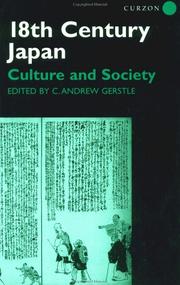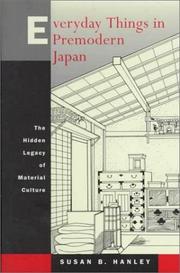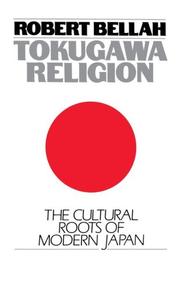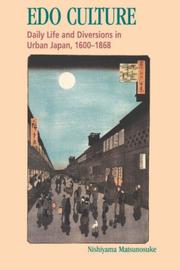| Listing 1 - 10 of 17 | << page >> |
Sort by
|

ISBN: 0700711848 Year: 1989 Publisher: Richmond : Curzon,
Abstract | Keywords | Export | Availability | Bookmark
 Loading...
Loading...Choose an application
- Reference Manager
- EndNote
- RefWorks (Direct export to RefWorks)
J4000.60 --- J3363 --- Japan: Social history, history of civilization -- Kinsei, Edo, Tokugawa period, early modern (1600-1867) --- Japan: History -- Kinsei, Edo period -- seclusion, sakoku (1639-1854), 18th century general --- J4150.60 --- Japan: Sociology and anthropology -- cultural history -- Kinsei, Edo, Tokugawa period, early modern (1600-1867)

ISBN: 0520204700 0520218124 Year: 1999 Publisher: Berkeley University of California press
Abstract | Keywords | Export | Availability | Bookmark
 Loading...
Loading...Choose an application
- Reference Manager
- EndNote
- RefWorks (Direct export to RefWorks)
Japan was the only non-Western nation to industrialize before 1900 and its leap into the modern era has stimulated vigorous debates among historians and social scientists. In an innovative discussion that posits the importance of physical well-being as a key indicator of living standards, Susan B. Hanley considers daily life in the three centuries leading up to the modern era in Japan. She concludes that people lived much better than has been previously understood--at levels equal or superior to their Western contemporaries. She goes on to illustrate how this high level of physical well-being had important consequences for Japan's ability to industrialize rapidly and for the comparatively smooth transition to a modern, industrial society. While others have used income levels to conclude that the Japanese household was relatively poor in those centuries, Hanley examines the material culture--food, sanitation, housing, and transportation. How did ordinary people conserve the limited resources available in this small island country? What foods made up the daily diet and how were they prepared? How were human wastes disposed of? How long did people live? Hanley answers all these questions and more in an accessible style and with frequent comparisons with Western lifestyles. Her methods allow for cross-cultural comparisons between Japan and the West as well as Japan and the rest of Asia. They will be useful to anyone interested in the effects of modernization on daily life.
Material culture --- Culture matérielle --- Japan --- Japon --- Social life and customs --- History --- Moeurs et coutumes --- Histoire --- J4150 --- J4140.60 --- Japan: Sociology and anthropology -- customs, folklore and culture --- Japan: Sociology and anthropology -- cultural history -- Kinsei, Edo, Tokugawa period, early modern (1600-1867) --- Social life and customs. --- J4150.60
Book
ISBN: 9780520262270 0520262271 Year: 2010 Publisher: Berkeley : University of California Press,
Abstract | Keywords | Export | Availability | Bookmark
 Loading...
Loading...Choose an application
- Reference Manager
- EndNote
- RefWorks (Direct export to RefWorks)
How did one dine with a shogun? Or make solid gold soup, sculpt with a fish, or turn seaweed into a symbol of happiness? In this fresh look at Japanese culinary history, Eric C. Rath delves into the writings of medieval and early modern Japanese chefs to answer these and other provocative questions, and to trace the development of Japanese cuisine from 1400 to 1868. Rath shows how medieval "fantasy food" rituals--where food was revered as symbol rather than consumed--were continued by early modern writers. The book offers the first extensive introduction to Japanese cookbooks, recipe collections, and gastronomic writings of the period and traces the origins of dishes like tempura, sushi, and sashimi while documenting Japanese cooking styles and dining customs. /from the publisher's website.
Cooking, Japanese --- Food habits --- Food --- Social aspects. --- Social aspects --- Japan --- Social life and customs. --- Cookery, Japanese --- Japanese cooking --- Foods --- Dinners and dining --- Home economics --- Table --- Cooking --- Diet --- Dietaries --- Gastronomy --- Nutrition --- J4152 --- J4140.60 --- Japan: Sociology and anthropology -- customs, folklore and culture -- food --- Japan: Sociology and anthropology -- cultural history -- Kinsei, Edo, Tokugawa period, early modern (1600-1867) --- J4150.60 --- Primitive societies
Book
ISBN: 9783862050109 Year: 2010 Publisher: Müchen : Iudicium,
Abstract | Keywords | Export | Availability | Bookmark
 Loading...
Loading...Choose an application
- Reference Manager
- EndNote
- RefWorks (Direct export to RefWorks)
J1560 --- J1650 --- J4150.60 --- J7900 --- Japan: Philosophy -- individual philosophers -- Kinsei, Edo, Tokugawa period, early modern (1600-1867) --- Japan: Philosophy -- ethics --- Japan: Sociology and anthropology -- cultural history -- Kinsei, Edo, Tokugawa period, early modern (1600-1867) --- Japan: Science and technology -- medical science -- general and history
Book
ISBN: 9784924971264 492497126X Year: 2009 Volume: 25 Publisher: Tokyo International house of Japan
Abstract | Keywords | Export | Availability | Bookmark
 Loading...
Loading...Choose an application
- Reference Manager
- EndNote
- RefWorks (Direct export to RefWorks)
National characteristics, Japanese. --- Japonais --- Japan --- Japon --- History --- Social life and customs --- Histoire --- Moeurs et coutumes --- Shoguns --- Politics and government --- J3360 --- J4140.60 --- J4000.60 --- Japan: History -- Kinsei, Edo, Tokugawa period, early modern (1600-1867) --- Japan: Sociology and anthropology -- cultural history -- Kinsei, Edo, Tokugawa period, early modern (1600-1867) --- Japan: Social history, history of civilization -- Kinsei, Edo, Tokugawa period, early modern (1600-1867) --- J4150.60 --- Japan - History - Tokugawa period, 1600-1868 --- Japan - Politics and government - 1600-1868

ISBN: 0029024609 9780029024607 Year: 1985 Publisher: New York Free Press
Abstract | Keywords | Export | Availability | Bookmark
 Loading...
Loading...Choose an application
- Reference Manager
- EndNote
- RefWorks (Direct export to RefWorks)
Japan --- Religion --- Social conditions --- 299.52 --- J1700.60 --- J4140.60 --- Godsdiensten van Japan. Shintoisme --- Japan: Religion in general -- history -- Kinsei, Edo, Tokugawa period, early modern (1600-1867) --- Japan: Sociology and anthropology -- cultural history -- Kinsei, Edo, Tokugawa period, early modern (1600-1867) --- -Social conditions --- -299.52 --- 299.52 Godsdiensten van Japan. Shintoisme --- -Japan --- -J1700.60 --- J4150.60 --- J4000.60 --- Japan: Social history, history of civilization -- Kinsei, Edo, Tokugawa period, early modern (1600-1867) --- Japan - Religion - 1600-1868 --- Japan - Social conditions - 1600-1868

ISBN: 0824817362 0824818504 9780824818500 9780824817367 Year: 1997 Publisher: Honolulu, HI: University of Hawai'i Press,
Abstract | Keywords | Export | Availability | Bookmark
 Loading...
Loading...Choose an application
- Reference Manager
- EndNote
- RefWorks (Direct export to RefWorks)
Japan --- Civilization --- 1600-1868 --- J4140.60 --- J4000.60 --- J3360 --- J4190.12 --- J4192 --- Japan: Sociology and anthropology -- cultural history -- Kinsei, Edo, Tokugawa period, early modern (1600-1867) --- Japan: Social history, history of civilization -- Kinsei, Edo, Tokugawa period, early modern (1600-1867) --- Japan: History -- Kinsei, Edo, Tokugawa period, early modern (1600-1867) --- Japan: Sociology and anthropology -- local communities and culture -- Kantō -- Tōkyō 23 ward area (Edo) --- Japan: Sociology and anthropology -- communities -- urban groups, the city --- J4150.60 --- Japan - Civilization - 1600-1868
Book
ISBN: 0804810818 Year: 1977 Publisher: Rutland Tuttle
Abstract | Keywords | Export | Availability | Bookmark
 Loading...
Loading...Choose an application
- Reference Manager
- EndNote
- RefWorks (Direct export to RefWorks)
Japan --- Description and travel. --- Social life and customs --- J3400 --- J3473.10 --- J4150.60 --- J4542.25 --- Japan: Geography and local history -- Honshū and Japan in general --- Japan: Geography and local history -- Kyūshū -- Nagasaki prefecture -- Nagasaki city --- Japan: Sociology and anthropology -- cultural history -- Kinsei, Edo, Tokugawa period, early modern (1600-1867) --- Japan: Economy and industry -- commerce and trade -- international trade, economic relations and policy -- Europe -- Netherlands --- Description and travel
Book
ISBN: 9004335153 9004336117 9789004336117 9789004335158 Year: 2017 Publisher: Leiden : Brill
Abstract | Keywords | Export | Availability | Bookmark
 Loading...
Loading...Choose an application
- Reference Manager
- EndNote
- RefWorks (Direct export to RefWorks)
Mediated by Gifts is a collection of essays by top scholars on gifts, giving and the social and political forces that shaped these practices in medieval and early modern Japan. The international assemblage of authors provides new insights into these deeply ingrained practices. The essays focus on topics such as shogunal visits to shrines and temples, exchanges between the imperial house and the shogun, a physician and his patients, the shogun, his vassals his and his ladies, the merchant class and the shogunal government, and between scholars and their cosmopolitan circle of contacts. This virtually unexplored view of Japanese history provides new tools to better elucidate both historical and modern Japan. Contributors are Lee Butler, Andrew Goble, Kaneko Hiraku, Laura Nenzi, Ozawa Emiko, Cecilia Segawa Siegle, and Margarita Winkel.
Gifts --- Ceremonial exchange --- Gift exchange --- Exchange --- Rites and ceremonies --- Donations --- Presents --- Generosity --- Manners and customs --- Free material --- Political aspects --- History. --- Social aspects --- J4158 --- J4150.50 --- J4150.60 --- History --- Japan: Sociology and anthropology -- customs, folklore and culture -- gifts and offerings --- Japan: Sociology and anthropology -- cultural history -- Muromachi, Sengoku and Azuchi-Momoyama periods (1392-1615) --- Japan: Sociology and anthropology -- cultural history -- Kinsei, Edo, Tokugawa period, early modern (1600-1867)
Book
ISBN: 9784866581484 4866581484 Year: 2021 Publisher: Tokyo Japan Publishing Industry Foundation for Culture
Abstract | Keywords | Export | Availability | Bookmark
 Loading...
Loading...Choose an application
- Reference Manager
- EndNote
- RefWorks (Direct export to RefWorks)
Tokugawa Japan was a time of immense cultural flowering ... This work provides a comprehensive review of two and a half centuries of peace - what the author calls the 'Pax Tokugawana' - and the expansion of learning and culture during those years. --
Japan --- Civilization --- Intellectual life --- J4000.60 --- J4150.60 --- J5500.60 --- J7000.60 --- Japan: Social history, history of civilization -- Kinsei, Edo, Tokugawa period, early modern (1600-1867) --- Japan: Sociology and anthropology -- cultural history -- Kinsei, Edo, Tokugawa period, early modern (1600-1867) --- Japan: Literature -- history and criticism -- Kinsei, Edo, Tokugawa period, early modern (1600-1867) --- Japan: Science and technology -- history -- Kinsei, Edo, Tokugawa period, early modern (1600-1867) --- Civilization. --- Intellectual life. --- 1600-1868 --- Japan.
| Listing 1 - 10 of 17 | << page >> |
Sort by
|

 Search
Search Feedback
Feedback About UniCat
About UniCat  Help
Help News
News